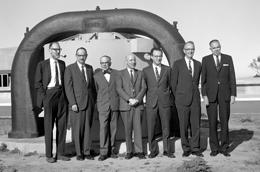Published online 7 November 2011 | Nature | doi:10.1038/news.2011.632
News
Experience counts for Nobel laureates
Study of prizewinning scientists suggests greatest discoveries are now made by middle-aged researchers, not young ones.
 How to win a Nobel prize: youthful brilliance has gradually given way to experience.LBNL/SPL
How to win a Nobel prize: youthful brilliance has gradually given way to experience.LBNL/SPL"Einstein, on this point, does not appear to be correct," says Benjamin Jones, an expert in innovation at the Kellogg School of Management at Northwestern University in Evanston, Illinois, who co-authored the study. "Scientists are typically getting older and the probability of making a discovery before age 30 has gone way down."
Working with Bruce Weinberg from Ohio State University in Columbus, Jones analysed 525 Nobel prizes awarded in physics, chemistry and medicine between 1900 and 2008. The pair used historical and biographical information to work out how old each laureate was when he or she performed the prizewinning work.
They found that with a few exceptions — notably the quantum mechanics discoveries of the 1920s and 1930s, which were often made by scientists under 30 — the trend across all fields is towards researchers being older when they produce their greatest work.
A victorious age
Comparing discoveries made before 1905 with after 1985, the average age at which physicists made their discoveries rose from 37 to 50. Chemists' average age rose from 36 to 46 and that of medical scientists from 38 to 45. Before 1905, 20% of prizewinning work was done before age 30, but by 2000, this fell to almost zero. The findings are published in the Proceedings of the National Academy of Sciences2.The age at which Nobel prizewinners do their key work has been studied before, but the emphasis has been on comparing fields, finding physicists are generally younger, rather than looking at changes over time, says Jones. He saw differences between fields too – for example, in chemistry the frequency of discoveries made over 30 and over 40 has increased significantly, whereas medicine has seen an increase in frequency of discoveries made over 30 but less so over 40. In physics, discoveries in the early twentieth century were made very young, before this field too joined the ageing trend.
“The probability of making a great discovery before age 30 has gone way down.”
To explain the ageing effect, Jones and Weinberg suggest a shift from theoretical work, in which youngsters do better, towards experimental work, which requires experience and aggregation of knowledge, and therefore favours older scientists.
They also suggest that as fields expand, it may take longer to accumulate the knowledge necessary to make a novel contribution. With the exception of 1920s physics, the analysis found that, over time, Nobel laureates received their PhDs later and that there has been an increase in discoveries that depend on previous work. This suggests a modern tendency to draw on more established knowledge, a skill at which older scientists excel.
Expensive pursuit
Other experts in scientific creativity welcomed the study but note other reasons why the age of laureates might have increased, such as improvements in health or the fact that, in many fields, research now requires expensive equipment. "21- and 22-year-olds simply don't get access to this kind of equipment," says Paula Stephan at Georgia State University in Atlanta, who provided some data for the Nobel study. She adds that it isn't always possible to pinpoint "one magic date" when scientists made their discoveries.Jones is cautious about drawing policy conclusions from the paper but notes that the increasing age of academics when they win their first independent research grants — a hot topic in the United States because many are now in their early 40s — could be "less wrong" than some might think. In some cases, he says, "maybe that really is the peak age now."
"It is important for people not to think that they are over the hill when they are 35 or 40," adds Stephan.
British chemist Harry Kroto of Florida State University in Tallahassee, who made his Nobel-prizewinning discovery when he was 46, isn't surprised that scientists are getting older when they make their breakthroughs. But he predicts that there will be a limit. "One tends to be in a rut [as one gets older] as far as doing crazy experiments that no one else has thought of," he says.
The anomaly of quantum physics also suggests that, in the case of a scientific revolution where established knowledge can be a hindrance rather than a help, the trend might reverse. This could provide a potential marker for identifying such events in future. "If there are future revolutions out there, it may make people younger yet again," says Jones.
-
References
- Brodetsky, S. Nature 150, 698-699 (1942). | Article |
- Jones, B. F. & Weinberg, B. A. Proc. Natl Acad. Sci. advance online publication http://dx.doi.org/10.1073/pnas.1102895108 (2011).
No comments:
Post a Comment